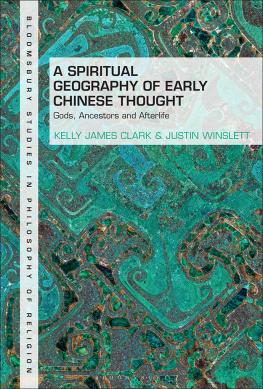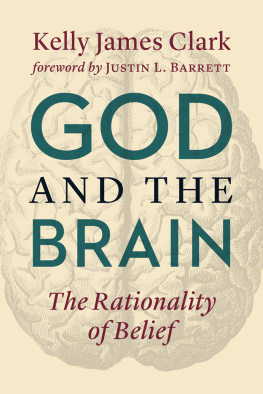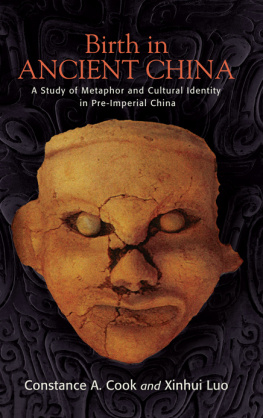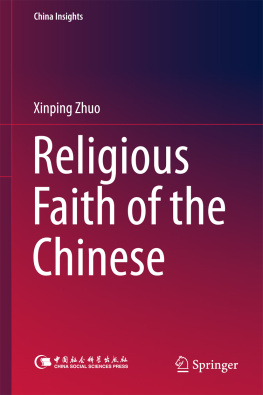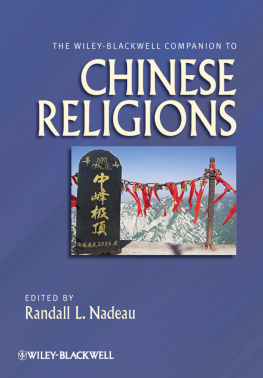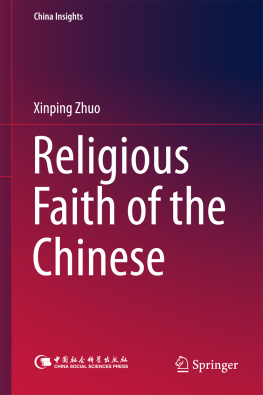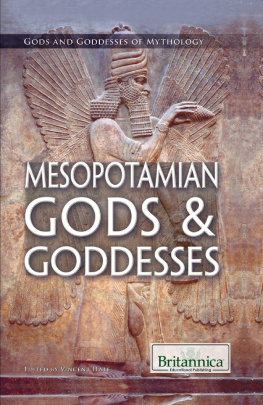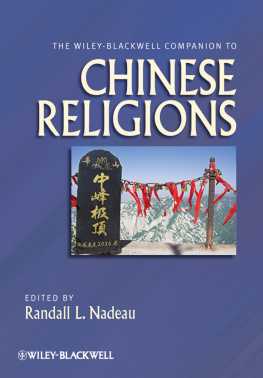A Spiritual Geography of Early Chinese Thought
Bloomsbury Studies in Philosophy of Religion
Series Editor: Stewart Goetz
Editorial Board: Thomas Flint, Robert Koons, Alexander Pruss, Charles Taliaferro, Roger Trigg, David Widerker, Mark Wynn
Titles in the Series
Freedom, Teleology, and Evil by Stewart Goetz
The Image in Mind: Theism, Naturalism, and the Imagination by Charles Taliaferro and Jil Evans
Actuality, Possibility, and Worlds by Alexander Robert Pruss
The Rainbow of Experiences, Critical Trust, and God by Kai-man Kwan
Philosophy and the Christian Worldview: Analysis, Assessment and Development edited by David Werther and Mark D. Linville
Goodness, God and Evil by David E. Alexander
Well-Being and Theism: Linking Ethics to God by William A. Lauinger
Thinking through Feeling: God, Emotion and Passibility by Anastasia Philippa Scrutton
Gods Final Victory: A Comparative Philosophical Case for Universalism by John Kronen and Eric Reitan
Free Will in Philosophical Theology by Kevin Timpe
Beyond the Control of God? edited by Paul M. Gould
The Mechanics of Divine Foreknowledge and Providence edited by T. Ryan Byerly
The Kalm Cosmological Argument: Philosophical Arguments for the Finitude of the Past edited by Paul Copan with William Lane Craig
The Kalm Cosmological Argument: Scientific Evidence for the Beginning of the Universe edited by Paul Copan with William Lane Craig
Free Will and Gods Universal Causality by W. Matthews Grant
Sacred Music, Religious Desire and Knowledge of God, by Julian Perlmutter
The Evolutionary Argument against Naturalism, by Jim Slagle
Why God Must Do What Is Best, by Justin J. Daeley
A Spiritual Geography of Early Chinese Thought
Gods, Ancestors, and Afterlife
Kelly James Clark and Justin Winslett

Contents
The Study of Religion in Early China
The study of religion in China, and in particular in early China (pre-220 CE), has been a subject of Western academic research for almost as long as modern Western academic research on China has existed. The earliest scholars of China from the West were more often than not missionaries who, owing to their calling, were deeply interested in the religiosity that they witnessed in their various missions. Though these figures provided productive insights into many local communities of their time, their missionary aims and goals also often colored descriptions of what they saw and read. In more modern academic parlance, their theoretical methodologies were sometimes based upon the religious doctrines of their own religious communities; their own religious doctrines, then, often framed how they understood and communicated religion in China. This primarily manifested as taking a broad category, Christian religion, as the epistemological or metaphysical framework of Chinese religion. The nineteenth-century missionary and sinologist James Legges choice of translating terms such as Heaven Tian and Shangdi , Chinas High Deities, as God has given some the impression that the early Chinese worshipped the Abrahamic God.
Later scholars moved decidedly away from assuming the axiomatic status of the Abrahamic religions (or any specific religion). Chun-Fang Yu, for example, claims of Chinese religions that there is no God transcendent and separate from the world and there is no heaven outside of the universe to which human beings would want to go for refuge (Yu 2007: 12435). Frederick Mote argued that The Chinese have no creator, god, ultimate cause, or will external to itself (Mote 1972: 26). Sociologist Marcel Granet, in La pense chinoise, claimed that the governing ideas of early Chinese thought included no world of transcendent realities outside the human world (Granet 1934: 279); Granet famously proclaimed, Ni Dieu, ni Loi (Granet 1934: 476). In his monumental A History of Chinese Civilization, sinologist Jacques Gernet likewise denied that the ancient Chinese were theists: The classical formulae, respect and fear Heaven .did not refer to a single, all-powerful God, the creator of heaven and earth, but instead evoked the ideas of submission to destiny, a religious respect for rituals, and serious and sincere conduct (Gernet 1985: 193).
While such claims can and should be seen as responses to the earlier more missionary assertions of some universalist, Abrahamic God, they also seem to reflect more the concerns of the contemporary scholars asserting them than specific aspects of religiosity in China. Such non-theistic sentiments concerning Chinese religion or even the Chinese have tended to dominate academic work on the subject for much of the late twentieth century.
Growing and more diverse understandings of religion and religiosity have brought about a scholarly reassessment of religion in China. Notable publications by scholars such as Michael Loewe (1979), Daniel Overmeyer (1995), Poo Mu-chou (1998), Michael Puett (2002), and the large collaborative work, Religion in early China (Kalinowski and Lagerwey 2009), have engaged with issues such as gods, ritual, performance, and social rolesissues that fall under the rubric of religion. They likewise have not only adopted a more narrow and focused approach to these specific topics, they have also developed their understandings of them from the diverse texts and recently discovered artefacts produced by the communities themselves. Through their methods, this scholarship has shown that religious life in early China involves a diverse panoply of religious paradigms, idioms, tropes, and practices held by diverse communities separated both geographically and temporally.
Such scholarship points to the need to approach religion in China not as some large, monolithic ideology (this is also true of religion as a category the world over (Boyer 2001)), and to be wary about the imposition of axiomatic concepts derived from specific doctrines of overarching religions. This scholarship requires looking at the large and emerging range of complex and intersecting concepts and issues that have in more modern times been organized under the rubric of religion.
A Spiritual Geography
Such an approach, a geography of religion, takes research on a topic as not unlike visiting a location in the complex map that makes up religion and religiosity. As one visits a topic, one in effect travels through this geography on a route that reveals the structures and methods through which these concepts intersect. Akin to a real geography, these routes will be varied and complex, reflecting the varied and complex ways in which communities understand and process these topics. Furthermore, also not unlike a real geography, we should also expect complex diversity alongside changing and even new routes. Indeed, the discovery of new routes reveals the ever-shifting and dynamic ways that local communities change in their engagement with these topics. Moreover, such explorations also reveal that such a vast religious geography continually presents many new and unexplored regions. As in any real geography, this is due not only to undiscovered areas, but also to the ever-changing connections to topics that may have earlier been thought outside the purview of the broad concept of religion. As such, we believe that the rediscovered connections of religion and philosophy in the earliest Chinese texts necessitate a thorough reexamination of early Chinese thought.
When mapping the religious geography of early China, it can be seen that there are now well-charted areas that have illuminated many ancient and diverse ritual practices, prescriptive paradigms, and religious prescriptions that have become salient in understanding the religious life of the diverse communities from this time. Yet, as noted, many areas of this spiritual geographyreferring to the domains of spiritsremain untrodden, including topics such as deities, ancestors, and the afterlife remain poorly understood. This more spiritual area of religious geography has loomed large as a relatively unexplored and ill-ventured area.
Next page
